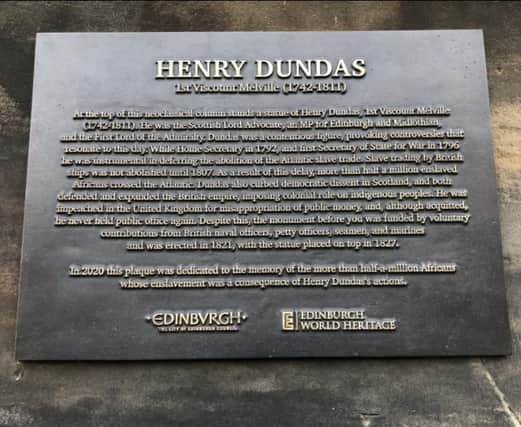'Who exactly would be apologising to who?' - Your views online


Vic Weddell: There’s no-one in the city alive who either contributed to or was affected by this so who exactly is apologising to who? Acknowledge by all means but an apology is nothing more than virtue signalling to be seen to be on message. It would be nothing more than a hollow apology.
Alistair Dunlop: Remorse is about something for which you take responsibility, something you had a part in, either activity or passivity. You can regret the actions of others but not be remorseful for them. You can learn from others’ misdeeds and recognise their wrong but you can't apologise for them as that has no meaning.
Advertisement
Hide AdAdvertisement
Hide AdJamie Donoghue: Why are people reacting so strongly to the idea of an apology? Surely acknowledging what happened, showing remorse for those affected and educating is exactly what we want future generations to experience?
Anne Bleazard: Absolutely – and it should also be taught in schools otherwise lessons will never be learned.
Jane Lawrie: Absolutely not, history is our past and hopefully how we learn. To apologise for things that happened centuries ago is ludicrous.
Janet Veitch: The problem I have with this whole issue is that slavery has become the marker by which countries, cities, historical figures etc are measured, irrespective of anything else. And not all slavery but any connection to the transatlantic slave trade, which the UK helped to stop. People don’t seem to understand that slavery is as old as time and still exists in the UK today. Why single out this one type of slavery during this particular period in historyto measure everything by?
Advertisement
Hide AdAdvertisement
Hide AdAmy Napier: Publicly acknowledging it and apologising doesn’t erase the past so really there is no harm in apologising and acknowledging that role. It leads the way to being better, learning from it and healing resentments that have grown since.
Cat McCluskey: How far does it go and who exactly is the apology to? The life we live today is built on the life that went before. We cannot and should not forget the past. It’s a learning curve for today just as today is a learning curve for tomorrow. Apologising for the past cannot change it but acknowledging it and learning from it can ensure the future is not made up of the same mistakes.
Marion Marshall: The best apology is to learn from history and make sure it never happens again.
Shona Bain: History is to be learned from. If you eradicate it you start all over again, future generations will have no knowledge of how things developed – right or wrong – in the past. We learn and go forward surely.
Advertisement
Hide AdAdvertisement
Hide AdAdam Rosa: I’m curious how highlighting something from history and bringing it to everyone’s attention can be considered “eradicating” it?
Val Anderson: This is not about “erasing” or “changing” the past. This is about teaching a more complete picture of it. If the power and wealth to have statues erected and streets and schools etc named after you has come from the suffering and exploitation of slavery then these facts should be plain to see. The past should be constantly reviewed & reappraised – it’s why we don’t still show the “Black and White Minstrels” on TV. This is not just about the role these men had in building our capital – it is about how we memorialise them.
Paul Knott-Smith: An apology is pointless. However, we should acknowledge our city’s role in the slave trade. Maybe a monument commemorating the lives lost and blighted by our ancestors’ greed and lack of humanity.
Anne Birrell: We don’t ask the other counties to constantly apologise for atrocities they committed throughout history but we do judge them on what they are doing now. If we are not doing enough now that is what we should be apologising for and putting it right.
Advertisement
Hide AdAdvertisement
Hide AdClark Duncan: Ah, the “you can’t re-write history” argument. So, using this supposed logic, Jimmy Savile is just part of history and there was no need to change the names of the buildings named after him or for the plaques celebrating him being removed or the charities he represented being closed down.
A message from the Editor:
Thank you for reading this article. We're more reliant on your support than ever as the shift in consumer habits brought about by coronavirus impacts our advertisers.
If you haven't already, please consider supporting our trusted, fact-checked journalism by taking out a digital subscription. Write to us at [email protected]
Comment Guidelines
National World encourages reader discussion on our stories. User feedback, insights and back-and-forth exchanges add a rich layer of context to reporting. Please review our Community Guidelines before commenting.
